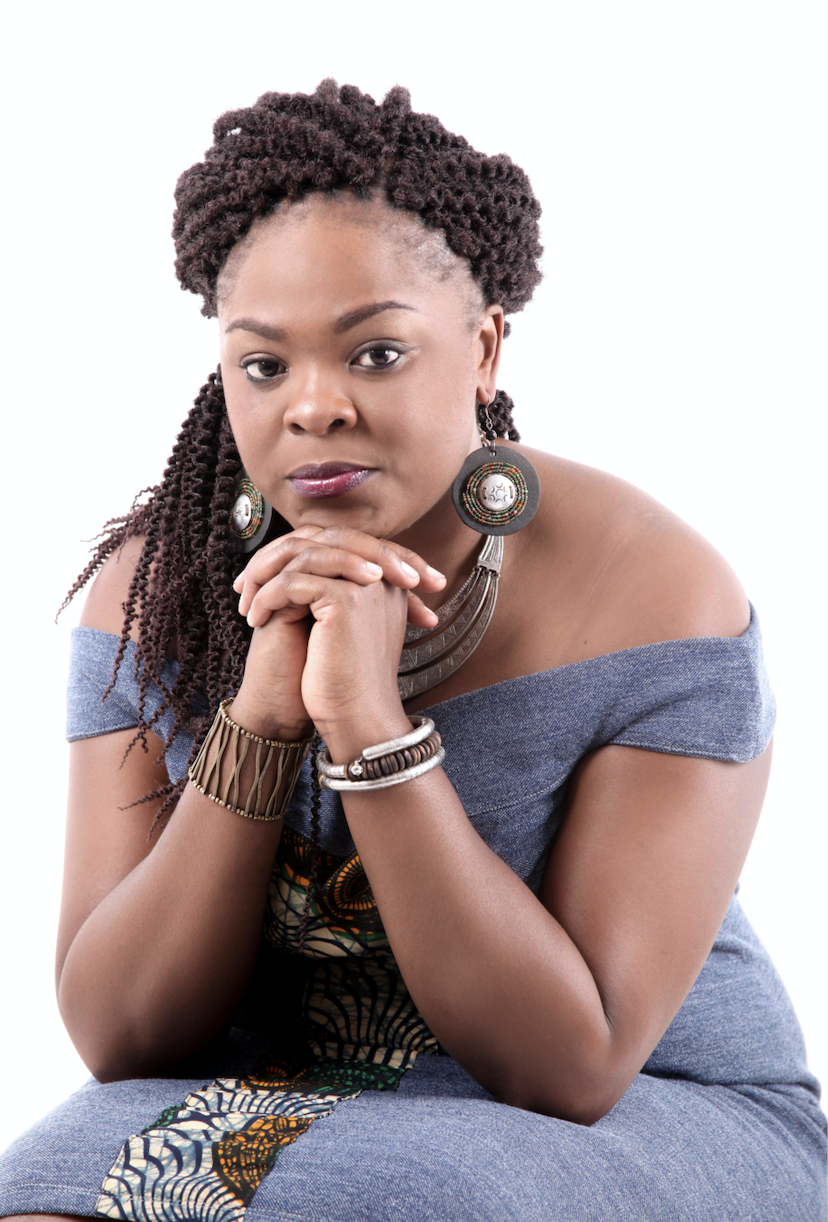
Betty Chilonde’s path to success took various twists and turns, but it started when she was a little girl. “I’m the second-last born in a family of ten children. My parents had a lot of dependants besides us, sometimes it was difficult to stand out as an individual. It wasn’t easy to express myself, as I seemed to be swallowed up in the group. It was always easier to keep myself busy with a book or doing music, which was the only way I could express myself at the time.”
Although she was originally a shy girl, a chance event while she was in high school led to her joining a Zambia band called MUVI POSSE. “When I was singing for MUVI POSSE, I did not have money to buy expensive dresses, so I looked through magazines and tried to design what I thought was fashionable for the stage. I looked to the likes of Miriam Makeba, Brenda Fassie, and our own Zambian music champion, Maureen Lupo Lilanda, then emulated their styles.”
Eventually, the time came where she had to decide whether to continue with the band or to further her education. “While I loved my music career, the fame that came with it did not translate into money, so I had to get my education.” Still, her time with Muvi Posse had given her a way forward. “My friends and family saw the clothes I wore while in the band and wanted to buy some for themselves. So I borrowed my mother’s sewing machine and started making clothes. I used some of the money I made to put food on the table and saved the rest. In time, I had enough saved to enroll into college and pursue accounting.”
A rather unexpected and disappointing obstacle proved to be the catalyst to her growing her business. “After making dresses for family and friends for a while, I noticed a trend that quite a few of them weren’t paying the price I asked, or took too long to pay me. The business suffered because of this, so I decided to face my fear of making new customers. I knew that I needed to look more professional if I wanted to succeed, so I moved my business out of my home and into a small shop.” This decision gained her new exposure and new clients, and soon she was saving for her next big step. “I figured with more knowledge, I’d be more competitive and able to make better quality clothes. This made me decide to invest in a fashion and design course.” After her studies, she launched Black Forest by Bulongo Clothing, a brand that features luxury clothes and accessories made from locally grown and woven fabric. “It is intended to revive the African dress culture to instill confidence and pride.”

Betty now works with two seamstresses and a weaver she consults to create her fashion lines, and their creations have gone on to be shown at major fashion events worldwide. “I am proud to have started and managed a business for more than 10 years, as well as getting on the global platform by showcasing at prestigious events such as the Paris Fashion Reception, Roma Fashion Week, Zambia Fashion Week and many others.”
Despite the success of her brand, Betty still faces her share of challenges, as the Zambian fashion industry is still in the early phases of its development. “I struggle to find skilled labor, but my biggest challenge to date has been finding customized or tailored financial injections to upscale my production.” Learning from her own struggles and experiences as an artist, she decided to establish the Bulongo Incubator for Fashion and the Creative Arts. “Artisans and other creatives in Zambia are stifled, first by their own families and then by the community. Everybody expects their child to be a doctor, or pilot. Art is considered to be for academically challenged individuals. I felt pained to see so much talent go to waste in young people. They need support and structure to allow them to thrive.
Regardless of the obstacles she faces, she has the right stuff it takes to have a lasting impact on Zambia’s fashion industry. “I see myself as having a brand that will be recognized for quality, originality and consistency. Bulongo Clothing will be a steady employer that will encourage and embrace ideas from every team player. As someone who is very passionate about the growth of the textile and art sector in Zambia, I hope to start engaging policy makers through the incubator and make them understand the importance of preserving dress culture for our people.”
Read more about the the Women’s Economic and Social Advancement programme










 The Trust supports and mobilises civil society networks on issues of ending child marriage, ending violence against children, ending female genital mutilation and promoting children’s rights, to carry out advocacy and action across Africa. Special focus is placed on Malawi, Mozambique, Tanzania and Zambia where child marriage continues to be a problem largely driven by poverty, gender inequality, harmful traditional practices, conflict, low levels of literacy, limited opportunities for girls and weak or non-existent protective and preventive legal frameworks.
The Trust supports and mobilises civil society networks on issues of ending child marriage, ending violence against children, ending female genital mutilation and promoting children’s rights, to carry out advocacy and action across Africa. Special focus is placed on Malawi, Mozambique, Tanzania and Zambia where child marriage continues to be a problem largely driven by poverty, gender inequality, harmful traditional practices, conflict, low levels of literacy, limited opportunities for girls and weak or non-existent protective and preventive legal frameworks.




 Education is a fundamental right for all children, which is also a vehicle for social, economic and political transformation in communities, countries and the African continent at large. Recent studies indicate a lack of progress in some of the critical commitments aimed at improving education quality, access, retention and achievement, particularly for girls. In most African countries, girls may face barriers to learning, especially when they reach post-primary levels of education. By implementing multi-dimensional approaches to education which includes core education, personal development, life skills and economic competencies, the Trust partners with funding partners, governments, civil societies and the private sector to improve education access.
Education is a fundamental right for all children, which is also a vehicle for social, economic and political transformation in communities, countries and the African continent at large. Recent studies indicate a lack of progress in some of the critical commitments aimed at improving education quality, access, retention and achievement, particularly for girls. In most African countries, girls may face barriers to learning, especially when they reach post-primary levels of education. By implementing multi-dimensional approaches to education which includes core education, personal development, life skills and economic competencies, the Trust partners with funding partners, governments, civil societies and the private sector to improve education access.

 The Nutrition and Reproductive, Maternal, New-born, Child and Adolescent Health and Nutrition, (RMNCAH+N) of the Children’s Rights and Development Programme aims at promoting the Global Strategy for women, children and adolescents’ health within the Sustainable Development Goals (SDG) agenda. The strategy emphasises on the importance of effective country leadership as a common factor across countries making progress in improving the health of women, children and adolescents.
The Nutrition and Reproductive, Maternal, New-born, Child and Adolescent Health and Nutrition, (RMNCAH+N) of the Children’s Rights and Development Programme aims at promoting the Global Strategy for women, children and adolescents’ health within the Sustainable Development Goals (SDG) agenda. The strategy emphasises on the importance of effective country leadership as a common factor across countries making progress in improving the health of women, children and adolescents. Through its Early Childhood Development (ECD) plan, The Trust will seek to put into action the new science and evidence Report that was presented by Lancet Series on Good and early development – the right of every child. This will be achieved by mobilising like-minded partners to contribute in the new science and evidence to reach all young children with ECD. The Trust’s goal is to be a catalyst for doing things differently, in particular, to rid fragmentation and lack of coordination across ECD sectors. In response to evidence showing the importance of political will in turning the tide against the current poor access and quality of ECD. Even before conception, starting with a mother’s health and social economic conditions, the early years of a child’s life form a fundamental foundation that determines whether a child will survive and thrive optimally.
Through its Early Childhood Development (ECD) plan, The Trust will seek to put into action the new science and evidence Report that was presented by Lancet Series on Good and early development – the right of every child. This will be achieved by mobilising like-minded partners to contribute in the new science and evidence to reach all young children with ECD. The Trust’s goal is to be a catalyst for doing things differently, in particular, to rid fragmentation and lack of coordination across ECD sectors. In response to evidence showing the importance of political will in turning the tide against the current poor access and quality of ECD. Even before conception, starting with a mother’s health and social economic conditions, the early years of a child’s life form a fundamental foundation that determines whether a child will survive and thrive optimally.